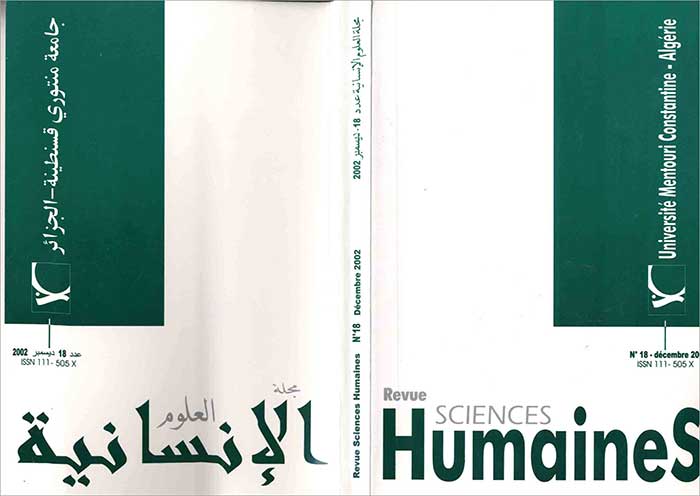Towards a better quality education in engineering and technology in developing countries
الملخص
In theory, it is by now very much clear and widely accepted that science and technology are necessary for progress and welfare. But, it is essential to point out here that in fact they have no real impact unless if they are applied to development at points of production. It therefore follows that allocated financial and human resources should be used and managed in a way as to maximise such an impact. Any action against this will result in wasting and costs.
In practice, and as far as developing countries are concerned, overall and technological performances are unfortunately not generally good. For, despite ambitious programmes and important investments made in the fields of technology transfer and education, only a few of those countries have succeeded in reducing the so called ‘technological gap’ and realised technological take-off.
ملخصنظريا إنه جد معروف وواضح الآن أن العلم والتكنولوجية هما ضروريان للتقدم و الرفاهية. غير أنه من اللازم الاشارة هنا إلى عدم فعاليتهما إلا إذا طبقا في مواقع الإنتاج. وعلى هذا الأساس، يفترض أن توجه وتسير الموارد المالية والبشرية بطريقة بحيث تعظم أثرهما.
من جهة أخرى وعمليا، فإن الأداء العام والتونولوجي بالبلدان النامية ليس جيدا على العموم. هذا بإعتبار أنه رغم البرامج الجد طموحة و الاستثمارات الهامة المسخرة في مجال العلم و التمنولوجية، إلا أن عددا قليلا فقط من تلك البلدان. استطاعت أن
How could one, then, explain this situation? This is exactly what this joint paper is concerned with. Based on some available data and practical observations of their country (Algeria), its authors attempt to add another explanation to what is actually provided in the literature about the issue. For them, the real problem has to do mainly with the way or manner with which the issue has been treated and managed. In brief, particular lack of flexibility and interactive facilities affect necessarily institutions’ good functioning and overall performance.التنزيلات
المراجع
Ben Dhia, H. (1994), «Place de la Culture et des Sciences Humaines dans la formation des ingénieurs en Tunisie» Confrence proceedings, Sfax, Tunisia, December.
Djaflat, A. (1994), «Education scientifique et technique et impératif technologique de l’industrie en Algérie» Colloque Mghrébin, Rabat: 18-19 Mars.
Dore, R. (1976), «The Diploma Desease: Education, Qualification and Development», University of California Press, Berkley and Los Angeles.
Findings (1995), « Maintenir la capacité d’enseigner dans des universités Africaines: problèmes et perspectives » n° 39 - 41, Octobre, pp. 1-3.
Fusfeld, U.I. and Haklisch, C.S. (1984), University-Industry Research Interactions, Pergamon Press, New York.
Hanusheck, E. A. (1995), «Interpreting Recent Research on Schooling in Developing Countries», Research Observer, vol. 10, n° 2, August, pp. 227-246.
Jakobiak, F. (1991), Pratique de la veille technologique, Editions d’Organisations, Paris.
King, K. (1989), «The Pursuit of Science and Technology Manpower : Some Conceptual Problems», Science, Technology & Development, Vol. 7, n° 2, August.
Närman, A. (1993), «Technical vocational training in Tanzania - a case study on moshi nvtc»
Proceedings Second International Conference on S & T in Third World Development, university of Strathclyde, Glasgow, April.
Office National des Statistiques, (1996), Annuaire Statistique de l’Algérie, n° 17, Décembre.
Oukil, M. S. (1996), «L’Université du Futur», Actes d’un séminaire national sur l’Université en Economie de marché, Constantine, Algérie.
Patrinos; H. A. and Lavoie, M. (1993), «Engineers and Economic development in Geece», Conference proceedings, Glasgow, April.
Prasad, K.. and al, (1993), «Waste in science and technology education in India», Conference proceedings, Glasgow, April.
Sabato, T. A. (1968), «Some comments on the Problem of the Best Utilisation of Scientific and technological Resources», Applied Science and World Economy, U.S. House of Rep.
Salam, A. (1989), «Science, Technology and Science Education in the Development of the South» Science, Technology & Development, Vol. 7, n° 2, August.
Silveira, M.P.W. (1985), Research and Development : Linkages to Production in Developing Countries, Westview Press, Boulder and London.
Sraieb, N. (1982), «Retard scientifique et technologique et évolution historique: le cas Marocain et Tunisien», Les Cahiers du CRESM, CNRS, pp. 156-181.
United Nations (1971), Plan d’Action Mondiale pour l’Application de la Science et la technologie au Développement, United Nations Publications. New York.
UNESCO (1988): La Science et la Technologie dans le Développement des Etats Arabes, Etudes et Documents de politique Scientifique, n° 40.
UNESCO, (1981), International Congress on Science and Technology education and national development, Final report, December, Paris.
Zawdie, G. and Gosh, D. (1994), «Tertiary Education and Technological Progress in transitional Economies: Whither Supply Push» Confernce proceedings, Sfax, Tunisia, December.

















